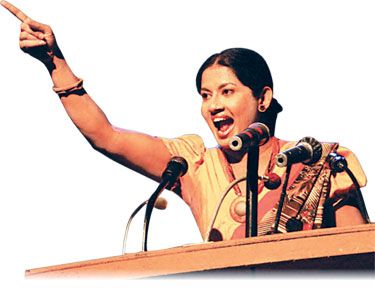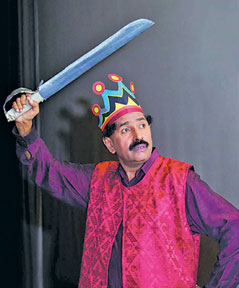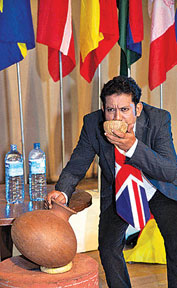|
As the ‘Suddha’ takes the stage:
Hybridisms, denials and the undeniable unfold
By Dilshan Boange
March 2 marked two significant events in my calendar. One is personal
and limited to those who share a bond with my alma mater Wesley College
Colombo as we celebrate the Founder’s Day. The other is when history was
made in the form of the Kandyan convention of 1815 was conceived to
realise a conditional ceding of the country’s administration to the
representatives of the British Crown.
 And
thus on this year’s March 2 where two very special events unfailingly
come to mind, I made a silent. And
thus on this year’s March 2 where two very special events unfailingly
come to mind, I made a silent.
engagement with a manifestation of a playwright’s ideology on
what the legacy of the British have left us with, to contemplate and
debate on.
A stage play turning into a pulpit
I went to the Tower Hall to watch Udayasiri Wickremaratne’s ‘Suddek
Oba Amathai’ a theatre production not entwined in intricate plots and
storylines but entertaining portrayals reflective of the reality of our
mindset(s) bound in an undeniable hybridism after having been once part
of the British Crown.
This reality was brought out through three monologues that turned the
stage into a pulpit for advocacy, adulation confession, revelation,
praise and worship as well as inquiry and interpretation both critical
and frivolous.
And by this method Udayasiri has given an unhindered voice to issues
battering Sri Lankan society on the matter of establishing identities
both individual and collective in the undeniably inescapable
postcolonial scenario that has thrust a hybridism upon us which we may
seek to deny.
The first segment of the play was delivered by Nalin Pradeep Udawela
a character representative of the neo-colonial mentality of ‘west
worship’.
Although the depth of the discourse by this character can span pages
and pages in discussion and debate I wish to address a very salient
point which I feel characterises the present day dilemma of those who
seek to ape the westerner for all the sophistry and flamboyance the
suddha is seen to have and flaunt.
The disservice done to the suddha
One of the disservices Udayasiri has done very callously to the
British is to declassify them from the exalted position of suddha and
reclassify the whole of the white skinned world in the western
hemisphere as suddho.
|
Mothers’ front
The other day I attended the
funeral of Manorani Saravanmuttue with my mother
I still recall that how I was shuddered out of my sleep as a
six year old
By hellish cries of tortured souls
Particularly that of women,
Thousands of mothers
Whose children’s lives were
snatched off at their prime!
The nameless three mothers
The top, middle and lowest
Strata of society
Were looking at the burning circles of fire
Through the red-blood flames
I saw their tearful eyes, woeful countenances
Searching for their snatched off sons, daughters
And the justice denied forever
I was the wretch
Who had to travel
Through the roads
Full of burning tyre-pyres,
Passages of misery and desolation
Answering the mid-term question-papers
For the third term at school
Endless blackout days,
Literarily burning midnight oil
Under the flickering light of the lantern
No reconciliation for them
No truth commissions
They are the forgotten souls
Forgotten forever
Under the façade of normalcy
Let those three mothers
Be mothers for the generation
Buried under maiden soil
Denying them of the morning sun-light of life
Ranga Chandrarathne
(Montage dedicates this poem for Richard de Zoysa on his
birth anniversary on March 13) |
The over generalisation of Europeans as Suddho has in my opinion
diluted the exclusivity accorded by Sinhala vernacular to the builders
of the Empire upon which to a certain extent in history the sun didn’t
set. The actor goes onto enumerate the countries of the suddha
who in his staunch belief should be respectfully referred to as Sudu
mahaththaru and includes the continental counties as well as
Scandinavian countries.He refers to Paris and speaks of its greatness
and incomparable beauty.
The confusion of identifying the ‘suddha’ from a nation(al) grounding
but mere skin colour alone is a crass negation of everything the
original suddha stood for and projected to the world.
The rather intensely pronounced British–Franco cultural animosity
from the countries separated by the channel tunnel seems not to have
found any treading whatsoever in the thinking of the character played by
Nalin Pradeep Udawela. Would the British feel flattered by profuse
praise and worship proffered by this character in its entirety?
Udayasiri has shown tongue in cheek very classily through this
performance to critique the very perceptions and conceptions that have
enslaved some Sri Lankans who would very likely display such servility
in their thinking to exalt the westerner as greater than the Lankan.
Effacing the western nations of nationalities
In the very generalisation the suddha ash lost his identity and the
whole of the western world is effaced of their respective
individualities as nations who proudly boast of rivalries and struggles
for regional superiority before venturing out to see what else is out
there in this flat tea saucer like world (before it was ‘discovered’ to
be a globe) carefully keeping away from the edge lest they fall into
oblivion. Therefore a larger question looms very hilariously tinged with
patches of darkness at the end of it.
Since the suddha worshiper’ of today may even not know of the
original suddha classification and its significances, (note since people
of the other two colonial powers the Portuguese and the Dutch were
referred to as parangi and lansi respectively) what exactly are they
worshipping?
Is it the entire white skinned anglophile world? Then would the
British like to consider the Australians as on par with them? (Australia
being very noticeably a much ‘less acknowledged cousin’ of the British
compared to the super power found across the Atlantic!).
There lies the dilemma that the neo-colonial may not be fully aware
of. Let us then raise the question large and loud to them who disdain
localism in favour of the Suddha–Who, or ‘What’ pray is your ‘suddha’?
Lessons in history
While Jayalath Manoratne’s performance came as more tactfully
executed in its cheekiness and audience appeal in terms of undetectable
sarcasm and naturally flowing wittiness the focus point would be the
relevance of history today to us in the wake of being at odds with out
hybridism.
The topic the second act dealt with was ‘History’. The depth and
scope of dealing with history in all its vastness and variations to make
it a discussion that covers the whole gamut of the subject would by
itself create history was a point that the character of Manorathne
stressed on at very much the outset of the monologue.
The approach taken to this subject was to look at the concept of
history as being two fold –written history that establishes the
mainstream discourse on history as a record or document and the other
being the history that people or individuals carry within them as their
‘personal history’.
 To
elaborate his argument the character cites the example of the last king
of Kandy King Sri Wickrema Rajasinghe about whom history has been
written and interpretive narratives are found in various forms from
books to lore that includes orally preserved traditional Sinhala poetry
or kavi. To
elaborate his argument the character cites the example of the last king
of Kandy King Sri Wickrema Rajasinghe about whom history has been
written and interpretive narratives are found in various forms from
books to lore that includes orally preserved traditional Sinhala poetry
or kavi.
He says while there is history written ‘about the king there’ is also
(a) history within him. And between these two forms of history there may
be discrepancies to ascertain the truth of what really was or could have
been is what is strongly inferred.
A Kunderian argument
However, in the classification of both of these narratives as being
history in the very same essence of the word, I wish to bring out a
point of contention based on a Kunderian perspective of how history
differs from ‘the past’.
The Book of Laughter and Forgetting by Czech author Milan Kundera
speaks very explicatively of how history becomes an account of events
that are archived and manipulated varying from written record to
photographs to topography that is meant to serve a strict political
agenda.
The past as in Kunderian conceptions is the narrative, the memory
that remains within the individual and does not find a place in history.
Perhaps the conception Udayasiri bears of history is that all events
past and preceding our present, by default, qualifies as ‘history’.
Yet the history is the narrative that accounts the rationale for the
‘present’ based on its position of being the authoritative narrative of
and from a ‘place of authority’.
In this context what can we speak of history and the hybridism that
was set out by the first monologue? One can contest that since the
advents of the suddha in Sri Lanka and his domination of writing history
from his perspective of the world at large and becoming a foremost
authority of a modern scientifically sound method of ‘recording the
past’ in to history, history itself now has a mould that serves the
outlooks of the suddha, the coloniser.
Although the discourse by the character of Manorathna portrayed a
person concerned of the erosion of our national history’s importance in
the national consciousness, and contention over the embracement of a
foreigner’s greatness, the monologue ends with a joviality of cynicism
admitting that the performance after all is just meant to be for the
stage and the moment of the performance and may not have an impact nor a
validity beyond the very stage it came to life on, as it was scripted
for the player by Udaysiri Wickremaratne.
Real purpose
What was the real purpose of doing so, one may question from the
playwright. What did such a gimmick seek to achieve from the audience?
Was it to suggest that the idea of resurgence in national minded
thinking to appreciate our nation’s pre-colonial history ends in a jest?
 Moving
on to the third and final performance of the drama the monologue of a
woman played by Madanee Malwattage delivered what seemed at first a
rather disjointed discourse when considering how the two previous
segments complemented each other from an ideological threading on the
basis of a postcolonial critique. Moving
on to the third and final performance of the drama the monologue of a
woman played by Madanee Malwattage delivered what seemed at first a
rather disjointed discourse when considering how the two previous
segments complemented each other from an ideological threading on the
basis of a postcolonial critique.
Theorem
Propounding a line of argument or theorem, as sadaranathwawadaya
which one may interpretively translate as ‘fairnessism’, the woman went
on to build a critique of social perceptions and interpretations of
gender roles and stereotypical behavioural moulds to define men and
women.
Through this theorem of ‘fairnessism’ the reversal of the emotional
beings within men and women when faced with ‘love’ took central focus in
giving an equation to make men and women as on par. Approaching the
subject of love and hate and how they are rooted in the same core of our
founts of emotions gave an almost epiphanous explanation to how the
discourse of the woman fitted into the previous two monologues.
A dual approach
There is in us in our search for our identity and a sense of
indigenousness in renouncing any subservience to the former coloniser, a
subconscious dilemma. A dilemma of dualities and divided loyalties.
There is both love and hate entwined within us threaded almost
inseparably in forming the outlooks we bear towards the suddha.
It is this opposing emotions coexisting within us and spiralling as
two different effects that causes us to both eagerly subscribe to fine
dining with a fully laid out table of cutlery and still resent the
suddha for all the plunder they are guilty of, the debasing they did to
our grand heritage by infusing ideologies of white supremacy to suppress
us through our own whitened hands no less. The love and hate theorem was
in my understanding a parody of the dilemma within us that makes our
disposition towards the suddha neither one of complete love nor utter
hate.
|

